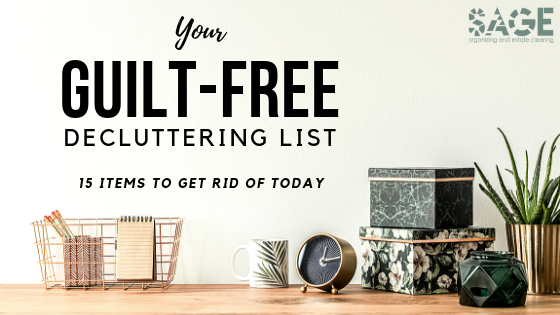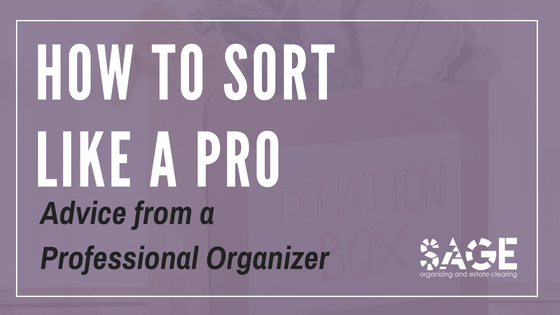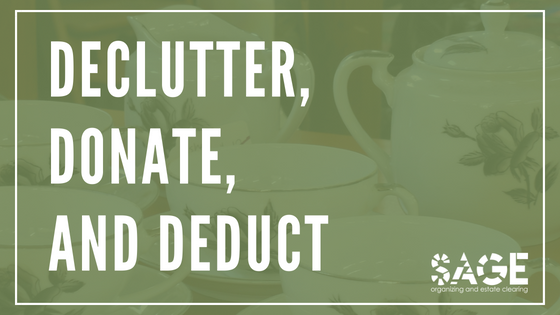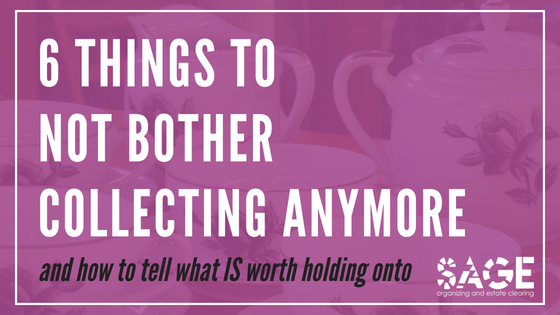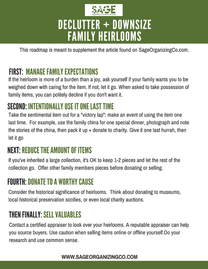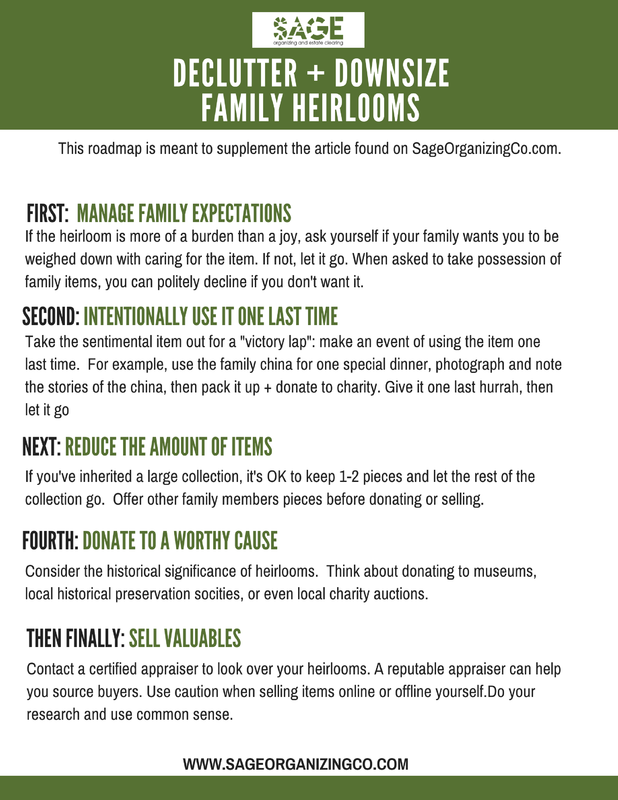|
Before you can get properly organized, it is important to declutter your home! Now wait, I can already hear you saying, "That's great Candi, but where do I START?!" I totally understand what you mean. It can be hard to decide what to give away and what to keep especially when we feel attached many items in our home. How many times have you thought, "Well, maybe I'll need this sometime in the distant future?" or "What if I regret/feel guilty about getting rid of this?" I know the feeling and that is why I am here to help! I have compiled a short list of 15 items you should NOT feel bad about getting rid of. Whether you are planning on moving, recently moved, or just plain tired of the disorganization, this list will guide you in starting to declutter your home. Some items on the list can definitely be thrown away, but I highly recommend you consider the condition of the item first and if it should be donated so that somebody else can benefit from it. Your GUILT-FREE Decluttering List 1. Old nail polishes and expired skincare/makeup 2. Clothing you haven't worn in years or clothing you bought years ago but never wore 3. Games and puzzles with missing pieces 4. Old children's toys and dog toys (this is important not only for decluttering but for sanitary purposes too!) 5. Books, including recipe books, that you don't plan on reading again or reading at all (be honest with yourself here) 6. Mostly empty cleaning supplies/bottles and condiment bottles 7. Broken jewelry or jewelry you never wear including watches 8. Old receipts, coupons, flyers, notes, and paper (If there is info you REALLY need, transfer it to a document on your computer/phone!) 9. Children's art work, completed school work, and old baby clothes... narrow down to just a few of these if you want memories or take photos on your phone. I know it can be hard, but you definitely don't need all of it! 10. Pens, markers, and any other craft supplies that are old or excessive 11. Old/frayed underwear, socks, and undergarments 12. Plastic bags from grocery and shopping stores 13. DVD's, CD's, and VCR tapes as well as old electronic players 14. Old, damaged cooking utensils such as spatulas and cooking spoons 15. Old or worn rugs, towels, and blankets (I especially like to switch out my old hand towels with new ones so I always have bright white and fresh towels in the bathroom!) Phew, and that's it folks! Of course, this isn't a comprehensive list for everything you need to get rid of, but it's a good place to start. And, let me remind you one last time, you do NOT need to feel guilty about throwing away or donating any of the items I listed! If you're looking for more organization ideas and tips, follow Sage Organizing Co. onPinterest! Need more help with organizing your home? Contact us and book a consultation to start your organized life today!
Professional Disclaimer: The ideas, recommendations, and opinions on this website, blog, and made in person are for educational and entertainment purposes only, and should not be considered legal, financial, or medical advice. I am not an attorney, doctor, or licensed financial professional. Sage Organizing Co., LLC is not liable for any losses or damages related to actions or failure to act related to the content of this website, blog, or in-person discussions. If you need specific legal, financial, or medical advice, consult a professional in your area.
0 Comments
It is a fact: in most family inheritance disputes, the only people who end up financially benefiting are the lawyers involved. But it doesn’t have to be that way! By organizing, documenting, and talking about your wishes early and often, you can solve family battles before they even begin. want to learn the 5 useful secrets for solving family inheritance disputes? read on...organize and document your wishesLong before it is necessary, start organizing and documenting your wishes. This means putting your wishes for “who gets what” in writing, preferable a legally binding will. Hire a lawyer to prepare the will, or create one yourself online at a reputable online company (such as LegalZoom). For example, if the eldest son is to inherit the family wedding ring so that he can keep it in the family, document it. Without express written decisions made in advance, family disputes can rise up. Tell your heirs your wishes so there are no unpleasant surprises after you’re gone. honor written wishesWhen a family member has passed away, the will is the legal document that has primary precedence is dividing up the remaining personal belongings, according to the law. It doesn’t matter if Grandma always told everyone that Billy should get the art collection: if it’s not in writing, it doesn’t legally count. If the deceased prepared an informal list of their wishes (or marked items with labels, as some people do) AND the heirs can agree to it, try to honor those wishes. The only people who financially benefit from estate battles are the lawyers involved. Related Articles: Sometimes You Can’t Do it on Your Own: When it’s Time to Throw in the Towel and Hire an Estate Clearing Professional to Help you Finish the Job Nobody Wants the Family Heirlooms: What to Do When it Happens to You with free Declutter +Downsize Family Heirlooms Game Plan Mom, We Have to Talk: 5 Ways to Discuss Downsizing with your Aging Parents with printable Discussion Cheat Sheet Don't remove anything from the house ahead of timeIf an ailing, aging parent remains in the home and starts “giving away” valuables or cash, the right thing to do is share that information with all the heirs. Often times the adult child who is the perceived “favorite” benefits from this: this is a sure way to cause family disputes in the future. Take the high road and disclose to other heirs what has already been given to you. After a family member passes, one of the very first things the Executor should do is change the locks to the house. This measure will prevent any neighbors, service providers, or unscrupulous heirs from “helping themselves” to belongings in the house. Nothing should be removed from the house until all the heirs can go through the home together. Always act with integrity and transparency to avoid family disputes over the belongings. immediate heirs onlyWhen it comes time for the heirs to organize and divide up the belongings, it should be the immediate heirs only. This means no spouses, children, grandchildren, or close family friends. Reducing the number of people involved will streamline the process and keep it simple. Related Articles: Help Organize Your Aging Parents (While They are Young + Healthy) with printable guide: Two Easyish Conversations to Have with Your Aging Parents Declutter, Donate, and Deduct 6 Things to Not Bother Collecting Anymore (and How to Tell What IS Worth Holding Onto) agree on a fair way to divide items equitablyBefore the heirs begin dividing up belongings, agree to a fair way to divide things up. Consider these ideas:
SummaryTake the time now to organize, document and talk about your inheritance wishes with your family. It will solve future battles before they even begin. Professional Disclaimer: The ideas, recommendations, and opinions on this website, blog, and made in person are for educational and entertainment purposes only, and should not be considered legal, financial, or medical advice. I am not an attorney, doctor, or licensed financial professional. Sage Organizing Co., LLC is not liable for any losses or damages related to actions or failure to act related to the content of this website, blog, or in-person discussions. If you need specific legal, financial, or medical advice, consult a professional in your area.
Whether you are organizing one room in your house or decluttering a home full of stuff, knowing how to efficiently sort is crucial to your success. Professional Organizers use the tips and tricks on this checklist to help clients, and now I'm sharing those hacks with you.
Ready to learn a professional organizer's tips for Sorting? Read on...Set yourself up for success
Before starting any organizing or decluttering job, make sure you have all the supplies you need before you get started.
Tools/ Supplies Needed:
Keep
The first step is to sort your "keepers" into a pile or one area. Keep items that you love and actively use. Items that aren't actively used should be moved into a long term storage area, such as a basement or attic.
Tools/ Supplies Needed:
*available space in actively used items *temperature variation in for long term solutions *transporting “keepers” to new location, if applicable Sell
Don't love it, but you'd like to make a little money from it? Consider selling online or offline.
Tools/Supplies Needed:
Related Articles
6 Things to Not Bother Collecting Anymore Nobody Wants Family Heirlooms: What to Do When it Happens to You. Gift These 5 Wonderful Experiences To the Ones You Love..Instead of Buying "Stuff" Donate
Have items that don't need to live with you anymore, but are still in great condition? Give to a local charity.
Tools Needed:
Discard
Some things just need to be discarded. If the items can't be sold or donated, its time for the trash/ recycling bin.
Tools Needed:
Related Articles
HOW TO DOWNSIZE YOUR HOME BEFORE MOVING 4 Smart Ideas to Sell Your Stuff Offline and 1 Really Dumb One with free printable How to Sell Items Offline Cheat Sheet 5 Tips to Sell Your Stuff Online with free printable How to Sell Items Online Cheat Sheet YOU'RE ready to sort like a pro!
Using this checklist, you now have the tools to Keep, Sell, Donate or Discard when you are decluttering and organizing.
Professional Disclaimer: The ideas, recommendations, and opinions on this website, blog, and made in person are for educational and entertainment purposes only, and should not be considered legal, financial, or medical advice. I am not an attorney, doctor, or licensed financial professional. Sage Organizing Co., LLC is not liable for any losses or damages related to actions or failure to act related to the content of this website, blog, or in-person discussions. If you need specific legal, financial, or medical advice, consult a professional in your area.
Decluttering your home and donating your items to local non-profit groups is a fantastic way to organize your home...and get a tax deduction.
Disclaimer: This information is compiled from many sources and is not intended as tax, investment, financial planning or legal advice and should not be relied upon as such. For tax, investment, financial planning or legal advice you are encouraged to consult with your personal advisers
Ready to learn how to Declutter, donate and Deduct? Read on...Declutter
When the organizing and decluttering bug strikes, separate things out to Keep, Discard, or Donate/Recycle piles.
Trying to figure out what you can easily declutter AND have it make a difference in your local community?
Donate
Before donating, be sure you are giving to an organization that is a 501 (c)(3) by the IRS. These are organizations that are recognized by the IRS as being tax-exempt by virtue of their charitable programs.
“Big name” charities (think Goodwill, Habitat for Humanity, or the Salvation Army) are no-brainers, but if you’re unsure about a group you’re thinking of giving to, you can always check their website or a site that vets non-profit groups, like Charity Navigator. Have big stuff to donate, but no truck and/or the muscles to get it done? Try the website Pick Up My Donation: they will find a non-profit group within 15 miles of your zip code and set up the pick-up, at no cost to you. Be sure you get a receipt or donation acceptance letter from the non-profit you give to. Keep a file in your glove box or console to organize on-the-go receipts, then transfer them into a permanent file in the house regularly.
Related Articles
Donate or Dumpster?: 3 Tips to Know What to Give Away vs. Throw Away 6 Things to Not Bother Collecting Anymore (and How to Tell What IS Worth Holding Onto) How to Beautifully Stage Your Home So it Sells in a Flash Deduct
Even though the standardized deduction for individuals and married couples has increased in 2018, it’s still a good idea to keep records of your charitable giving.
Keep track of what you give!
get organized and do good!
Decluttering, donating and deducting is a great way to organize your home, while making a difference in your community at the same time.
Professional Disclaimer: The ideas, recommendations, and opinions on this website, blog, and made in person are for educational and entertainment purposes only, and should not be considered legal, financial, or medical advice. I am not an attorney, doctor, or licensed financial professional. Sage Organizing Co., LLC is not liable for any losses or damages related to actions or failure to act related to the content of this website, blog, or in-person discussions. If you need specific legal, financial, or medical advice, consult a professional in your area.
Related Articles:
Sometimes You Can’t Do it on Your Own: When it’s Time to Throw in the Towel and Hire an Estate Clearing Professional to Help you Finish the Job. Nobody Wants the Family Heirlooms: What to Do When it Happens to You 5 Steps to Get Rid of Sentimental Clutter
How do you know which things in your collections have lost value over the years, and which are worth keeping? It can be tough to tell!
Items that your parents (or you) paid a lot of money for back in the day are now worth much, much less than was paid for them. An aging population has caused a heavily flooded market, making "valuables" less so. As a Professional Organizer and Estate Clearing Specialist, I see a lot of these collectibles in homes. Some are worth keeping, but unfortunately, most are not. Want to know what is worthless and how to tell the difference? Read On.
Loss in Value: Figurines and Commemorative Plates
|
|
Click here to download the Declutter + Downsize Family Heirlooms Game Plan.
|
Want to learn what to do when nobody wants the family heirlooms? Keep Reading.
#1 Manage Family Expectations
Obviously, there are many family heirlooms that are truly treasured and gratefully accepted. However, there are also heirlooms that younger generations accept out of a sense of duty, guilt, or without even being asked if they want.
Burden vs. Joy
If you're soon-to-be-inheriting, carefully consider what you honestly want to accept. Accepting a family heirloom should be a joy, not a burden to carry. If you do not have the space for the item, respectfully decline to take it. If the item causes you emotional or financial distress, don't take it. Think of it this way: would your grandmother want you to have to pay for a storage unit so you can keep her dining room table?
The Guilt
Often times, it is guilt that forces us to take things we really don't want. Human beings have the tendency to merge their emotions for a person into the THINGS that person owned. But remember: it is just a THING, not a person. Your love for your great aunt isn't lessened because you don't want her silver tea set. You still love her...you just don't love tea sets.
Things Nobody Ever Wants
There are things that get held onto and passed down that nobody ever wants. Letters written in anger, racist antiques, and ashes of the deceased top the list. If an heirloom makes you feel sad, ashamed, or unjustly burdened, give yourself permission to get rid of it. The things that live in your house should make you feel happy.
Tacky and outdated collections are another thing nobody ever wants. Consider selling or donating items you know you will never even take out of the box.
Help Organize Your Aging Parents (While They are Young + Healthy)
Mentally Prepare for Downsizing Your Home: 4 Tips to Control Your Emotions
Declutter, Donate, and Deduct
#2 Intentionally Use It One Last Time
Another idea is to frame the heirloom and display it in your house. Baptismal gowns, old letters and recipes, photographs, and military awards all lend themselves to display in shadowboxes. Have items professionally framed to preserve them.
Perhaps one of the best ideas I've come across is giving the item a "Victory Lap". Let's say you've inherited the family wedding china...which has been packed away and sitting in your attic since you got it. Using the Victory Lap concept, you would make an event out of using it one last time.
Unpack the china and set your table with it. Invite as many family members as you can for dinner to use the china, even if it's just takeout pizza. During dinner, reminisce about the family member that owned the china and take lots of photographs. Offer each family member a place setting to take home. Pack up and donate the remaining pieces to charity. Be sure to share the photos with your family.
#3 Cut Down Collection Size
If it is a collection you'll never use or display, give yourself permission to let it go. You may feel guilty for selling or donating am family heirloom collection that a grandparent spent years building, but remember: theses are just THINGS, not a person. You still love your grandparent even if you donated their Depression glass collection.
#4 Donate to a Worthy Cause
#5 Sell Valuables
The best advice is to consult with a reputable certified appraiser. Having a professional appraiser look at your items is worth the reasonable fee they charge. Professionals can keep you from throwing away things your thought were fakes (such as jewelry) and give you an idea of what an item may be worth.
If selling items yourself, use extreme caution. Be sure to only accept cash from buyers, meet at a safe public location, and have another person with you. You can never be too careful.
- Mom, We Have to Talk: 5 Ways to Discuss Downsizing with your Aging Parents
- Assess the Mess: How to Plan out Downsizing a Home
- 4 Smart Ideas for Selling Your Stuff Offline...and 1 Really Dumb One
- Sometimes You Can’t Do it on Your Own: When it’s Time to Throw in the Towel and Hire an Estate Clearing Professional to Help you Finish the Job.
Now you have a game plan
Professional Disclaimer: The ideas, recommendations, and opinions on this website, blog, and made in person are for educational and entertainment purposes only, and should not be considered legal, financial, or medical advice. I am not an attorney, doctor, or licensed financial professional. Sage Organizing Co., LLC is not liable for any losses or damages related to actions or failure to act related to the content of this website, blog, or in-person discussions. If you need specific legal, financial, or medical advice, consult a professional in your area.
Grab a free game plan here!
Categories
All
Back To Schoool
Before & After
Closet Organization Ideas + Hacks
Decluttering Your Home
Downsizing Your Home
Estate Clearing
Family Heirlooms
Family Schedule Logistics
Free Download
Garage DIY Organization
Garage Mudroom
Grocery Planning
Holiday Organizing
Home Organizing
Later Life Planning
Meal Planning
Mental Health
Moving
Organizing Aging Parents
Organizing Products
Selling Offline
Selling Your Stuff
Sentimental Items
Weekly Family Routine
Looking for something?
Archives
November 2023
October 2023
September 2023
April 2021
March 2021
February 2021
January 2021
December 2020
November 2020
October 2020
September 2020
August 2020
July 2020
June 2020
May 2020
April 2020
March 2020
February 2020
January 2020
December 2019
November 2019
October 2019
September 2019
May 2019
April 2019
March 2019
November 2018
October 2018
September 2018
July 2018
June 2018
May 2018
April 2018
March 2018
February 2018
January 2018
December 2017
November 2017
October 2017
September 2017
August 2017
June 2017
May 2017
April 2017
March 2017

